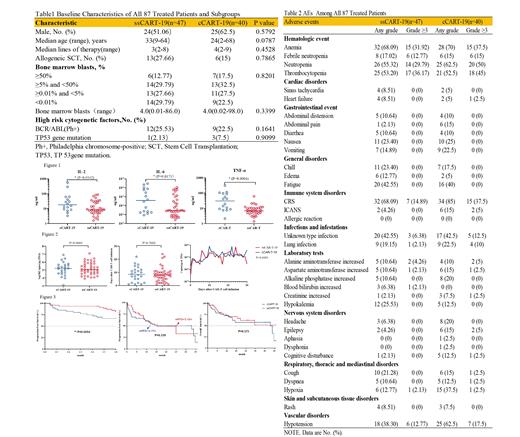Background:
Severe cytokine release syndrome (CRS) and immune effector cell-associated neurotoxicity syndrome (ICANS) are significant challenges in the use of anti-CD19 chimeric antigen receptor (CAR) T-cell therapy for patients with relapsed or refractory B-type acute lymphoblastic leukemia (r/r B-ALL). These complications limit the widespread adoption of CAR-T therapy. To address this issue, we developed a novel approach using anti-CD19 CAR T-cells incorporating a small hairpin RNA (shRNA) element to silence the interleukin-6 (IL-6) gene (ssCART-19). By reducing IL-6 expression levels in ssCART-19 cells, we aimed to decrease monocyte activation and pro-inflammatory cytokine release, thereby mitigating the incidence of severe CRS and neurotoxicity. In this phase 1/2 clinical trial conducted at two centers, we compared the efficacy and safety of ssCART-19 to classical CART-19 cells (cCART-19) in patients with r/r B-ALL (NCT03919240).
Methods:
Peripheral blood mononuclear cells were collected from patients through leukapheresis. ssCART-19 cells were generated by transducing anti-CD19 CAR with a shRNA-IL-6 gene silencing element into bulk peripheral T lymphocytes using a lentivirus vector. In contrast, cCART-19 cells were only transduced with an anti-CD19 CAR. Both cell types contained 4-1BB and CD3ζ co-stimulatory domains. Lymphodepletion (fludarabine at 30 mg/m 2/day and cyclophosphamide at 300 mg/m 2/day) was conducted on days -5, -4, and -3 before infusion. Each patient received a dose of 5×10 6CAR +/kg. The primary endpoint was safety, with efficacy as the secondary endpoint for both ssCART-19 and cCART-19.
Results:
A total of 121 patients who had received at least two prior lines of treatment were screened for this study. A total of 47 patients received ssCART-19 and 40 patients received cCART-19 were included in the analysis. The median patient age of group ssCART-19 and group cCART-19 was 33(9-64) years and 24(2-68) years. At enrollment, ssCART-19 patients and cCART-19 patients had a median percentage of BM blasts of 4.0(0.01-86.0) % and 4.0(0.02-98.0) % by flow cytometry. ssCART-19 patients and cCART-19 patients had a median of 3 (2-8) and 4(2-9)prior lines of therapy(table 1).
The transfection efficiency was 44.66% (range: 13.70-84.66%) for ssCART-19 and 39.98% (range: 14.0-65.0%) for cCART-19. Adverse events within 28 days included grade 3-4 neutropenia in 14 patients (29.79%), thrombocytopenia in 17 patients (36.17%), grade 1-2 CRS in 25 patients (53.20%), grade 3-4 CRS in 7 patients (14.89%), and grade 1 ICANS in 2 patients (4.26%) in the ssCART-19 group. In the cCART-19 group, adverse events within 28 days included grade 3-4 neutropenia in 20 patients (50%), thrombocytopenia in 18 patients (45%), grade 1-2 CRS in 19 patients (47.5%), grade 3-4 CRS in 15 patients (37.5%), grade 1-2 ICANS in 4 patients (10%), and grade 3 ICANS in 2 patients (5%). The incidence of neutropenia, thrombocytopenia, grade 3-4 CRS, and ICANS in the ssCART-19 group was significantly lower than that in the cCART-19 group (p < 0.05)(Table 2). Furthermore, the peak levels of IL-6, IL-2 and TNF-α were significantly lower in the ssCART-19 group compared to the cCART-19 group (p < 0.05)(Fig.1). No significant differences were observed between the two groups in terms of the start time, peak value, duration and killing efficacy of CART cells (p > 0.05)(Fig.2).
As of the data cutoff on December 25, 2020, the median follow-up time was 12 months (range: 0.5-41.33). On day 28, with 91.49% of patients achieving complete remission (CR) or CR with incomplete hematological recovery (CRi) in ssCART-19, compared to 85% in the cCART-19 group. Median overall survival (OS) was not available for ssCART-19, while it was 32.93 months for cCART-19 (p=0.575). The median progression-free survival (PFS) was 14.17 months for ssCART-19 and 15.33 months for cCART-19 (p=0.339). Although no significant differences were observed in terms of 3-year OS and PFS, the 3-month PFS was higher in the ssCART-19 group compared to the cCART-19 group (82.3% vs 66.9%, p=0.045)(Fig.3).
Conclusion:
Our clinical studies demonstrated the safety and high efficacy of ssCART-19 with IL-6 gene silencing in patients with relapsed/refractory B-ALL. These findings support the potential of ssCART-19 as a promising therapeutic approach for this challenging patient population.
Disclosures
No relevant conflicts of interest to declare.


This feature is available to Subscribers Only
Sign In or Create an Account Close Modal